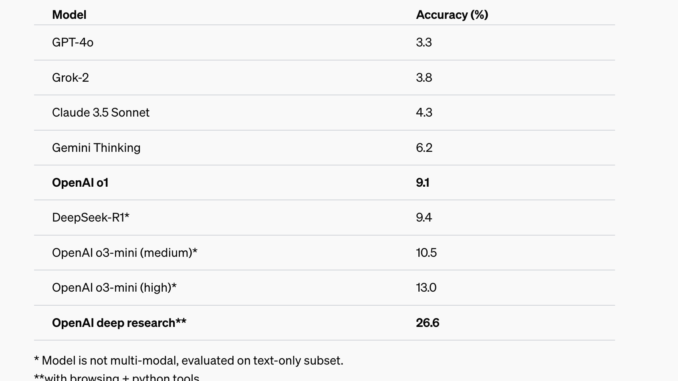
The document entitled Unlocking the Future: OpenAI’s Deep Research Agent Transforms Multi-Step Information Synthesis highlights a notable progress in artificial intelligence. This pioneering research agent is crafted to boost the efficiency and precision of information synthesis across diverse fields. By utilizing advanced algorithms, it methodically examines and integrates various data sources, streamlining the research experience for users. The implications of this innovation stretch far beyond simple convenience, pledging to revolutionize how experts perform research and reach well-informed conclusions. As OpenAI persists in enhancing this agent, it is positioned to establish new benchmarks in the domain of information processing and evaluation.
OpenAI has launched Deep Research, a resource intended to support users in performing comprehensive, multi-step inquiries on numerous subjects. Distinct from conventional search engines, which yield a list of links, Deep Research amalgamates information from multiple sources into thorough, well-documented reports. This characteristic is especially beneficial for professionals in sectors like finance, science, policy, and engineering who need organized, in-depth insights.
Deep Research assists users in executing organized research by autonomously gathering, analyzing, and summarizing information from various sources. The tool produces detailed reports with references, enabling users to save time and elevate the quality of their research.
Primary Features of Deep Research:
Autonomous Research: The tool performs multi-step research tasks, modifying its methodology based on real-time data.
Multi-Modal Input: Users can enrich queries by incorporating text, images, PDFs, or spreadsheets for added context.
Extensive Reports: Deep Research provides well-organized reports, soon to feature embedded images, data visualizations, and analytical insights.
Performance Benchmarking: The model has excelled in expert-level research assignments, showcasing its capacity to manage intricate inquiries.
Step-by-Step Instructions for Utilizing Deep Research:
1. Accessing Deep Research:
Ensure you are a ChatGPT Pro user, as Deep Research is currently accessible only to Pro subscribers.
Log in to your ChatGPT account.
2. Initiating a Research Inquiry:
Within the ChatGPT interface, locate the message composer.
Select the “Deep Research” option to enable this feature.
3. Submitting Your Inquiry:
Type a research question or topic in the text area.
Upload pertinent files, like PDFs or spreadsheets, to provide additional context.
Submit the inquiry and allow the system to process the request.
4. Processing Duration:
Deep Research usually completes tasks in 5 to 30 minutes, based on the request’s intricacy.
You will be notified when the research is finalized.
5. Reviewing the Report:
The generated report contains a summary of findings and relevant citations.
Future updates will incorporate embedded images, data visualizations, and further analytical components.
Illustrative Use Case:
Imagine you’re exploring recent developments in the retail sector.
Step 1: Open ChatGPT and enable Deep Research.
Step 2: Enter a query like “Examine the notable changes in the retail industry over the past three years.”
Step 3: Upload any relevant data or documents for better context.
Step 4: Submit the inquiry and wait for the research to be conducted.
Step 5: Examine the final report, which may feature trends, statistical information, and expert insights with accurate citations.
Conclusion:
Deep Research equips users with organized, well-sourced information, simplifying complex research tasks. By following the described steps, users can effectively utilize this resource for generating detailed insights. As OpenAI continues to enhance the feature, it is anticipated to become an even more valuable asset for researchers and professionals alike.
Check out the Details here. All acknowledgment for this research goes to the researchers of this project. Additionally, don’t forget to follow us on Twitter and join our Telegram Channel and LinkedIn Group. Make sure to join our 75k+ ML SubReddit.
🚨 Marktechpost is inviting AI Companies/Startups/Groups to collaborate for its upcoming AI Magazines on ‘Open Source AI in Production’ and ‘Agentic AI’.
Aswin AK serves as a consulting intern at MarkTechPost. He is currently working towards his Dual Degree at the Indian Institute of Technology, Kharagpur. His enthusiasm for data science and machine learning is complemented by a solid academic foundation and practical experience in addressing real-world cross-domain issues.








Be the first to comment